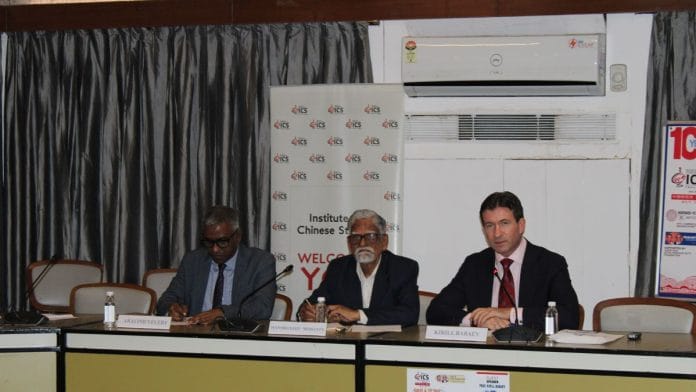New Delhi: Russian academic Kirill Babaev believes that a Russia-India-China front would shape a Eurasian international order for the 21st century, thereby ending the current Western-led global order and moving towards a fairer international order for the “Global South” nations.
“We are living in turbulent times. We see a revolution in international relations happening now. It is up to us to shape it. The first thing that irritates most people is the dominance of the US in the world economy. It is no longer acceptable for the countries in the Global South,” Babaev, director at the Institute of China and Contemporary Asia of the Russian Academy of Sciences, said at the Gargi and VP Dutt Memorial Lecture, organised by the Institute of Chinese Studies recently in New Delhi.
Babaev went further to claim that “Eurasia is probably the fastest-growing region in the world. It is home to countries that will shape the global economy in the decades ahead.”
Eurasia is loosely defined as the region that starts from Russia in the West to Japan in the East, across the continent of Asia. The key powers in the geographic region are Russia, India, China, the countries of West Asia, including Saudi Arabia, the United Arab Emirates, other Gulf nations, and the nations of Central Asia.
With this view, Babaev argues that an emerging axis of Russia-India-China cooperation would ensure the end of the current US-led unipolar world order, both in a physical and financial sense.
“Russia does not have as strong an economy as China. China does not have enough influence in the developing world, such as Africa or Latin America. India has growing technological power but not enough political influence,” Babaev pointed out as the reason for the three countries to combine on the global stage.
However, such a combination of interests would rely on India and China resolving a number of their strategic issues, especially on the Line of Actual Control (LAC), while also balancing New Delhi’s ties with Washington D.C.
When the question of the India-China border tensions was raised, Babaev offered Moscow’s own experience of solving border issues with Beijing in the late 1990s and early 2000s as a possible blueprint for India to follow in resolving its border dispute with China.
“What do we need—India and China must resolve their border issues. We had to compromise. If you solve the border issues, it will boost economic cooperation and political cooperation… However, such a scenario could be achieved only if they see a common future and common benefits,” said Babaev.
But questions surrounding the efficacy of India signing on to a Russian-Chinese international project remain unanswered. For Babaev, a Eurasian future remains an achievable dream when India and China resolve their border issues, and the gains far outweigh any potential losses.
“[RIC] is not a friendship against someone. It is quite constructive for the world. We [Russia] do not have an alliance with China. We do not need it. This grouping is not anti-US. We do not need [a military alliance like] NATO. What we need is a constructive merger of common interests in order to create something bigger,” said Babaev.
ThePrint was a media partner of the event.
(Edited by Radifah Kabir)
Also Read: World media has 2 warnings for India—climate-induced stress & ‘tax terrorism’ despite Modi’s reforms






